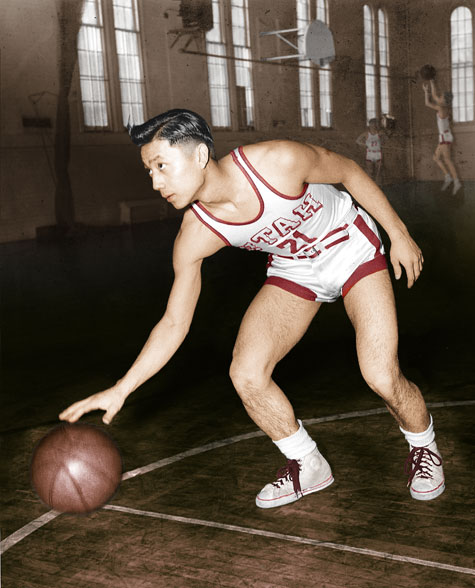
RUNNIN' WITH THE UTES Misaka at Utah. |
He only played three games and scored seven points in the 1947-48 season, but Wataru Misaka's story is netted, slammed, and sealed in NBA history. The 5'7" Japanese-American was the New York Knicks' first-round draft pick and the first non-white basketball player in the NBA — an epic feat given the nation was suffering from anti-Asian sentiments stemming from World War II and West Coast internment camps were still in operation.
But most sports buffs know nothing of his influential rec-ord, according to filmmakers Bruce Alan Johnson and Christina Toy Johnson, who directed Transcending: The Wat Misaka Story, which will make its New England debut at the Rhode Island International Film Festival on Saturday, August 8 at 5 pm at the Columbus Theatre. Misaka will be at the screening.
The directors think the telling of Misaka's story is long overdue. The Basketball Hall of Fame has a case dedicated to "Diversity In the NBA," but Misaka, the first ethnic player to break into the sport originally called a "white man's game," was not included in the exhibit until this week. While pleased that the now 85-year-old is represented, the directors think it has something to do with a little thing called racism.
"A lot of times people will look at race and think either you're black or you're a damn foreigner," said Bruce Johnson, quoting Paul Osaki, who runs the Japanese Cultural and Community Center of Northern California. "The Asian culture tends to be the unknown minority."
Using black-and-white basketball footage and 66 pounds of newspaper clippings provided by Misaka, the 86-minute documentary offers a look at the fledgling NBA and Misaka's rise. Born to Japanese parents in Salt Lake City, he tore up the basketball court from a young age. Grainy footage shows his feet sweeping past opponents, intercepting shots, and diving for passes.
"He did the same things American kids did. He played sports," said Bruce Johnson. "He was just was really good at it."
Misaka attended the University of Utah and was a star on the championships teams in 1944 (NCAA) and 1947 (NIT); he took two years off to serve in the military during World War II, working as a Japanese interpreter. Misaka was picked in the '47 NBA draft by the Knicks after Madison Square Garden owner Ned Irish saw the crowd's support for the point guard during the NIT.
But the affection was limited to Misaka's home turf. On the road, surly crowds would scream offenses such as "Dirty Jap go home" and grab him from the sidelines. After three games with the Knicks, Misaka was told to pack it up and go home without an NBA contract. His last game (against the Providence Steamrollers) was the only one he started.
"They paid him, said we're sorry, and didn't give him an excuse," said Johnson.
He was later asked to join the Harlem Globetrotters, but declined the invite. He instead finished his engineering degree and went on to be a professional bowler.
Despite the taunts, jeers, and jabs, the directors said Misaka rarely commented on the politics of race.
"He tended to turn a cheek all the time. He never got angry at that kind of stuff," Johnson said. "I think if he had, his career would not have been nearly as successful."